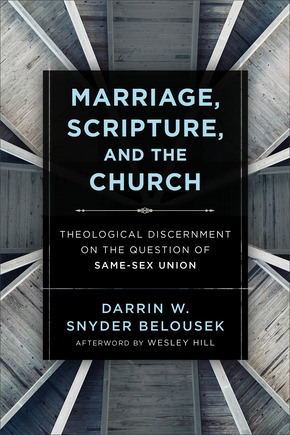I came to this book hoping for a careful, balanced, and respectful analysis of arguments for marriage innovation and defence of traditional marriage. I was not disappointed. In his Afterword to the book, Wesley Hill writes that this book is ‘one of the most careful, judicious, and cogent defenses of the so-called traditional Christian view of marriage and sexuality that we now have’ (p. 289). For anyone seeking discernment on the question of same-sex union, this book is well worth the read.
The book is laid out in four major parts: Surveying the Situation; Framing the Question; Evaluating the Case; and Seeking a Direction. In the first part, Snyder Belousek presents the current situation of the church and society and lays out his approach and assumptions. Among other things, he declares here his high view of Scripture, that any arguments for marriage innovation should be judged at the bar of Scripture. In the second part, he frames the issue as a matter of marriage and goes on to examine what marriage is in itself. He does this from both Scripture and tradition, with special consideration of Jesus’ views as seen in the Gospels. He also examines early church debates on marriage and virginity. This all leads him to determine that marriage innovation necessarily implies substantial change to the doctrine of marriage. In part three he examines arguments for innovation from historical precedent and potential biblical warrants for innovation. He shows that both fall short of presenting a convincing case. He then turns, in part four, to arguments for innovation that do not require justification from Scripture (which also fall short) before finishing with presenting some guidance for discernment going forward.
This book is excellent and I would wholeheartedly recommend it. Snyder Belousek presents the traditional case carefully and clearly and examines arguments for innovation fairly and without ridicule. However, he also goes further, demonstrating areas where traditionalists have often innovated in marriage without thinking about it. He presents challenges to us to carefully consider what marriage is and to question whether we have moved beyond it without providing adequate justification, or even noticing.
In addition to the 300 odd pages in this book, he has provided a substantial set of appendices online with further material that did not fit within the scope his book, which you can access directly here.
This books is available to purchase from Waterstones.
Phil Foster, Buccleuch Free Church, Edinburgh

